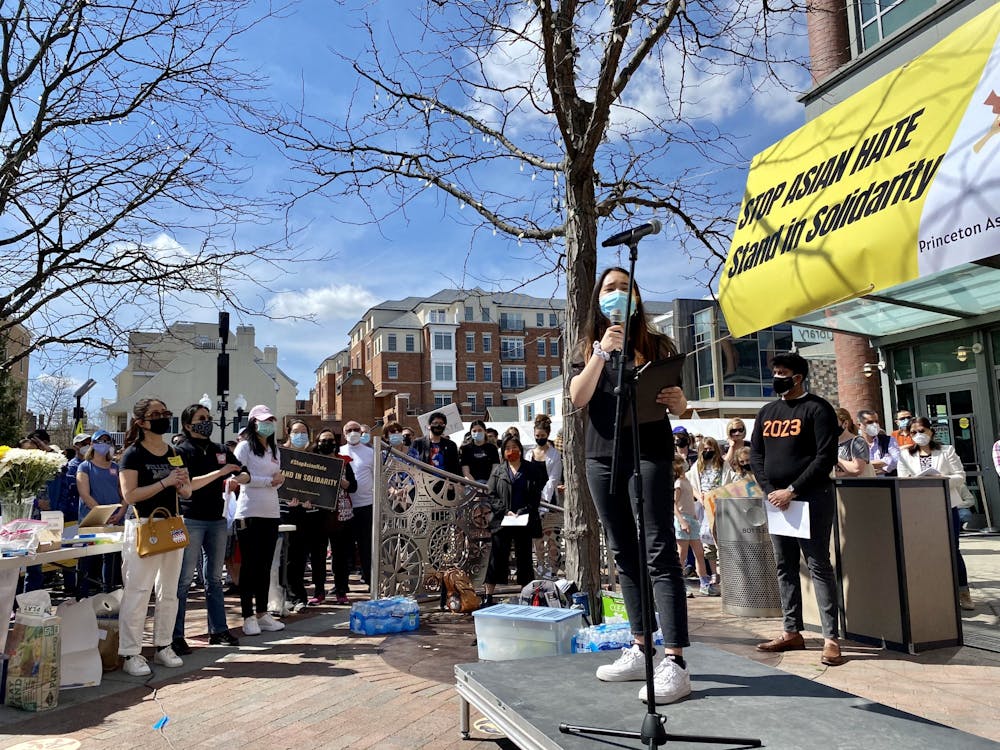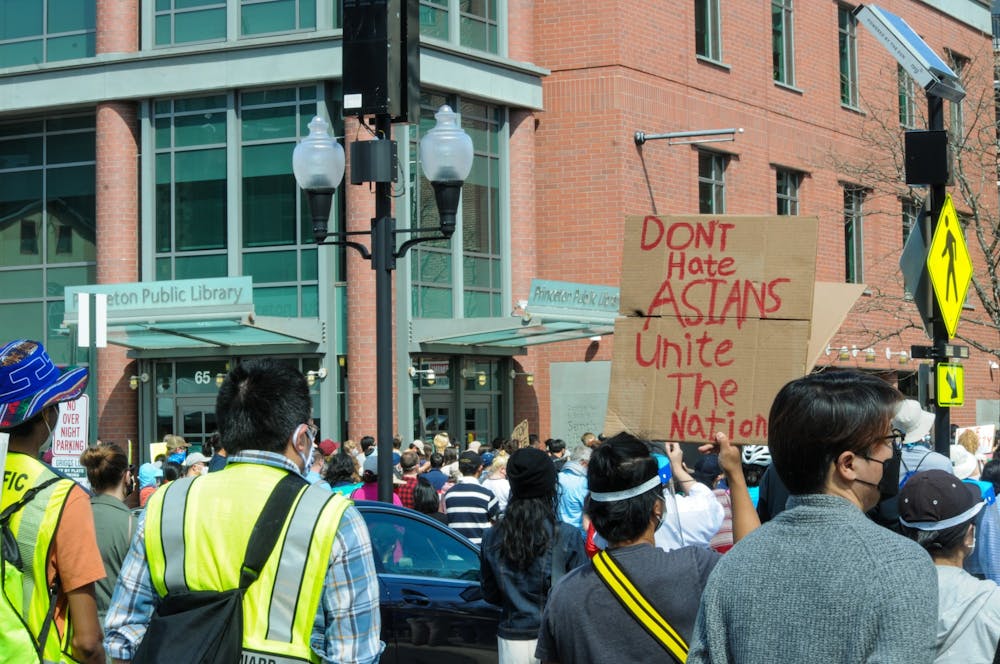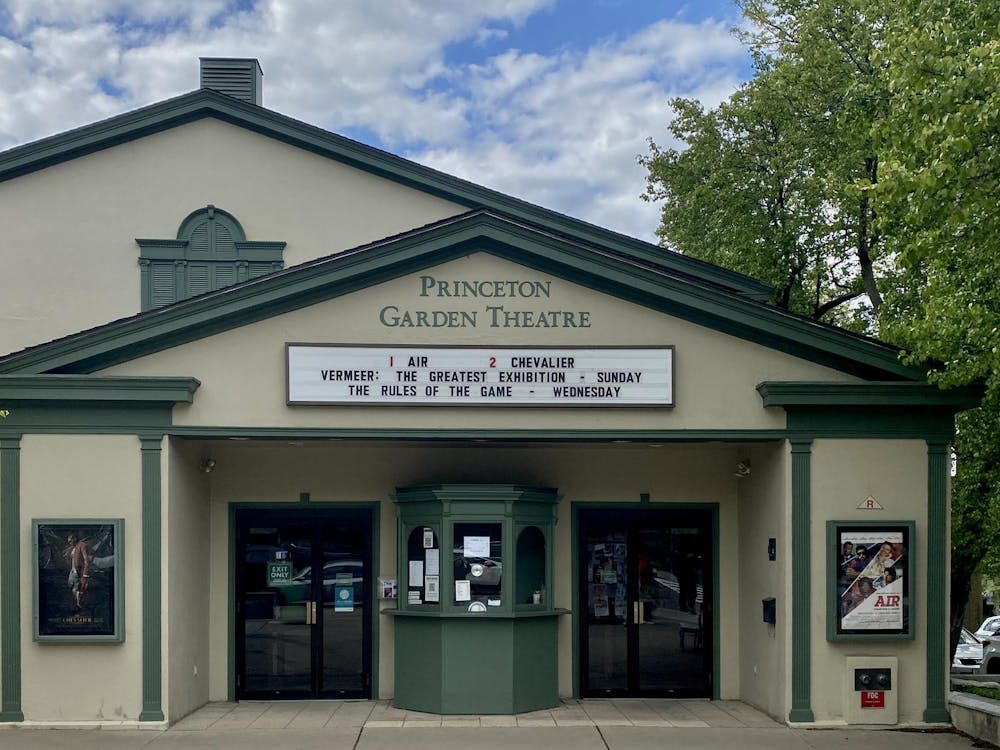“Our existence is resistance,” said Sadaf Jaffer, former mayor, current Chair of the Inclusion & Equity Committee in Montgomery Township, and Postdoctoral Researcher in the Princeton Institute for International and Regional Studies (PIIRS), at a Stop Asian Hate rally and vigil in Princeton this weekend. It was held to condemn the recent acts of violence against members of the Asian and Asian American community as well as to emphasize America’s long history of anti-Asian sentiment.
On March 27 at 1 p.m., hundreds of people gathered at Hinds Plaza for the rally. Protesters, who were instructed to be socially distant by organizers, appeared spread out and masked. Along with stickers and incense sticks, the organizers distributed extra masks, while emphasizing a social distancing protocol.
The event began with a speech from Reverend Robert Moore from the Coalition for Peace Action, who concluded, “We’re here to say no to that hate, no to that violence, and yes to peace.”
After a prayer led by Pastor Mia Chang of NextGen Church, the director of the Asian American Program at Princeton Theological Seminary, David Chao listed the names of the eight victims killed by a gunman during the March 16 attacks on spas in Atlanta, Ga.: Daoyou Feng, Hyun Jung Grant, Suncha Kim, Paul Andre Michels, Soon Chung Park, Xiaojie Tan, Delaina Ashley Yaun, and Yong Ae Yue.
He spoke briefly of each of the victims, including the family members they left behind, before asking the crowd to observe one minute of silence in remembrance of the lives lost. As outdoor diners nearby slowly quieted their conversations and birds chirped overhead, the crowd became collectively silent.
Jasmine Ueng-McHale, a local clinical psychologist, was tasked with moving the group forward. She led a meditation, which she hoped would “ground us, free our energy, and rally our resources.” Ueng-McHale asked attendees to look inward and give space to their emotions before looking outward to those around them as “one community, resolved and ready for the work ahead.”
Following the meditation, Ueng-McHale led the crowd in a chant: “We feel our worth. We feel our power. We are enough. Love will prevail.”
Speaking to the worth and power of the Asian and Asian American community, Jennifer Lee ’23 and Kesavan Srivilliputhur ’23, co-presidents of the Asian American Students Association (AASA), emphasized the role of education in upholding and dismantling systems of oppression.

“For decades upon decades Asian Americans have been silenced — no, erased — from the textbooks of American history. Forgotten. Cast aside. Invisible. To my fellow Asian Americans, now is the time to seek visibility,” Lee declared.

Jennifer Lee ’23 and Kesavan Srivilliputhur ’23, co-presidents of AASA, speaking at the rally.
Courtesy of Ben Chang
Lee and Srivilliputhur argued that visibility in history education and places of power are necessary steps toward ensuring that future students no longer experience such anguish.
Lee spoke directly to the University community, urging them to take a stand and to take up space.

“We must stand united, and we must be seen,” she said.
She went on to describe the hurt perpetuated by continued silence.
“To be quite frank with you, it is terrifying to just be an Asian American woman right now,” said Lee. “To those that uphold this system of oppression, may we remind you your silence is deafening.”
Srivilliputhur emphasized the importance of standing in solidarity with the Asian and Asian American community during this time and detailed his own experiences with racism as a Desi American.
“Despite well over a century of history within the U.S., we are still often treated as perpetual foreigners. Growing up in a primarily white suburb in Texas, I often faced this as my classmates told me that my lunch smelled weird or as their parents asked me where I was really from.”
Jaffer, who teaches in the University's South Asian Studies program, shared her own experiences with exclusion and hatred.
After being elected to public office, Jaffer said her opponent posted on social media, “I was born in this country and some Indian’s gonna tell me what to do?”
Zoey Nuland, a Chinese American eighth grader at Princeton Unified Middle School, shared a poem expressing her own sentiments of anger toward the recent acts of violence.
“It’s funny that you feel a need to speak and breathe about how disgraceful a culture and group of people are when the truth is you are just unhappy about how far our normal is from yours,” said Nuland in her poem.
Sam Wang, a University professor in the neuroscience department, called for New Jersey’s diverse community of Asian Americans to unite with similar groups who are also interested in yielding increasing political power for the increasing Asian American population.
Vice President for Campus Life W. Rochelle Calhoun, who attended the protest, echoed this emphasis on unity.
“I believe hate and violence in any community can only be fought through solidarity for all of our community,” she said. “And while this is very specifically about Asian hate, I want to stand in solidarity with my Asian brothers and sisters as an African American woman.”
Throughout the protest, speakers combatted the myth of the “model minority,“ which members of the Asian and Asian American community have grappled with throughout their history.
“We are not your model minority. We never have been and we never will be. By no means are Asians a monolith — far from it,” said Lee.

Eliza McGinley, left, with her mother Karen McGinley, right, who works for the University as a Senior Associate Director of Annual Giving.
Isabella Shutt / The Daily Princetonian
Many, including Jaffer, called for increased education in schools pertaining to cultural competency and racial literacy to combat racism. Professor Beth Lew-Williams, who was praised by Lee and Srivilliputhur for her work at the University, outlined major moments of oppression and triumph in Asian American history, urging other educators to make visible the community’s contributions over time.
“To be racially literate is educational excellence,” continued Princeton High School Assistant Principal Cecilia Birge. “It is important that we disrupt this hate. And it starts with clearly creating environments where education matters more than anything we do on any given day.”
Diego Solorio ’24 described the protest as “very empowering.”
“I hope that after this movement, Asian Americans group together with people of color to rise above racism in general,” said Solorio.
Several speakers emphasized that their work will not end with a single protest. They argued that, on the road to equality, this was simply a crossroad.
Kirsten Pardo ’24, who attended the event with a classmate, said she hopes it starts conversations and begins the process of finding solutions.
“You have to acknowledge a problem first before you can actually fix it,” she explained, before sharing the importance of the event in demonstrating to Asian American students the power of the community that surrounds them.
Yingying Zhao, another event speaker, delivered a moving address to the crowd which was centered around the symbolism of her name.
“In America, this March, I texted my friend ‘What will kill me first: being a woman in America or being Asian?’ All he responded with was ‘I’m sorry,’ because we both knew the answer,” she said.
“Therefore, I say Yingying means ‘Listen to me America, this is your reckoning.’”
The protest was organized by several local organizations, including: the Princeton Chinese Community, Witherspoon-Jackson Neighborhood Association, Not in Our Town Princeton, Central Jersey Chinese American Association, New Jersey Vietnamese American Community Association, La Convivencia New Jersey, Latin American Legal Defense Fund, Unidad Latina en Acción New Jersey, United Chinese Americans New Jersey, The Coalition for Peace Action, The Racial Justice Taskforce of the Utilitarian Universalist Congregation of Princeton, Rotary Club of Princeton, Princeton Human Services Commission, Princeton Progressive Chinese Association, Princeton Theological Seminary’s Asian American Program, Princeton University Chinese American Parents Association, Association of Chinese Students and Scholars at Princeton University, The Montgomery Township Equity and Inclusion Committee, and String of Pearls Reconstructionist Synagogue.








